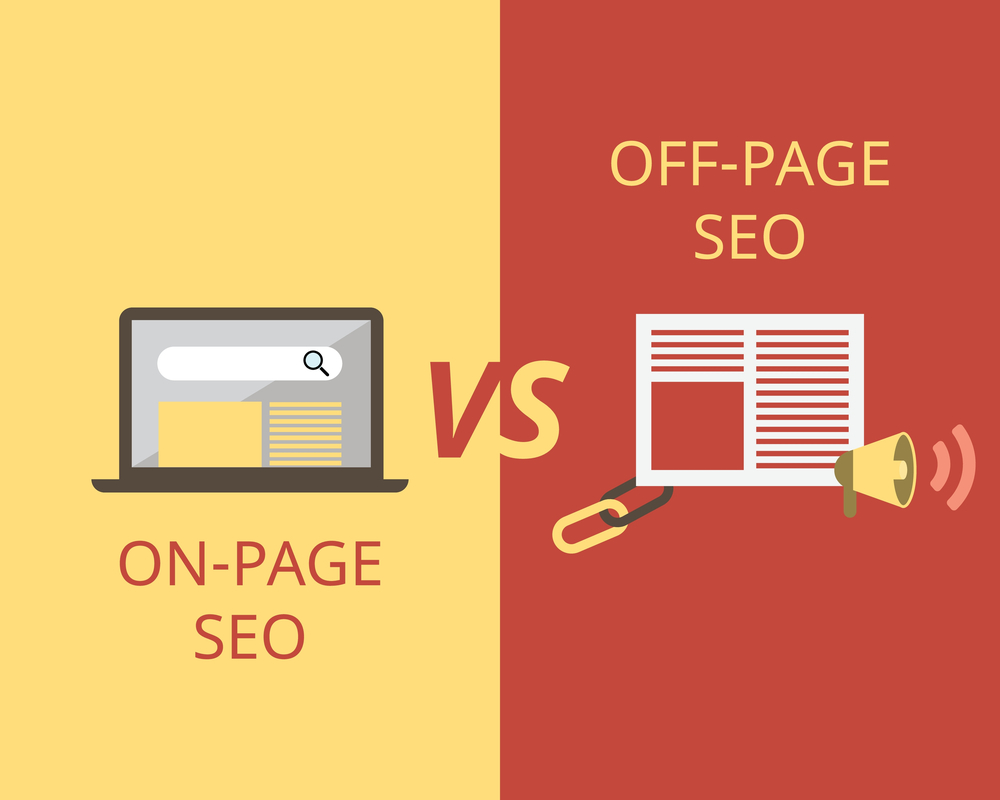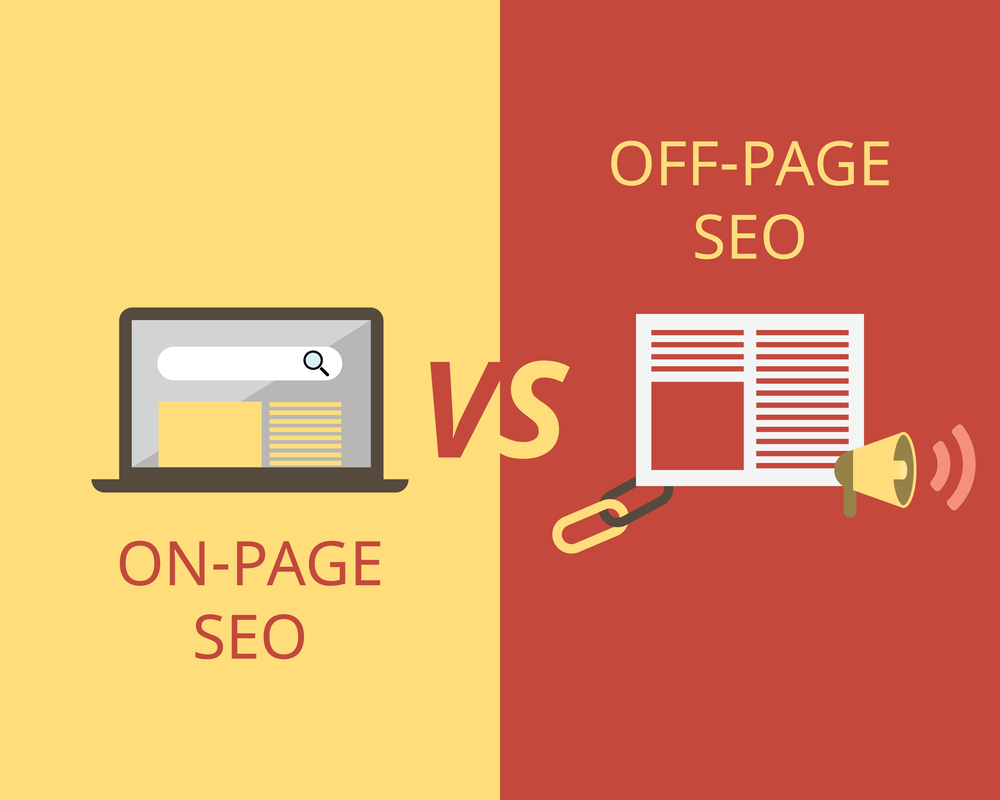
Search engine optimization (SEO) seems to be the name of the game lately when it comes to your online business presence, but what exactly does SEO involve?
SEO refers to several strategies you can use to boost your web page and website rankings in search engine results. Some of these strategies focus on optimizing your content with specific keywords, image alt text or compelling meta descriptions. This is known as on-page SEO. Other SEO ranking factors look at external elements like links, referring domains and social media shares, and this is known as off-page SEO.
With 53% of website traffic coming from organic search, it’s essential to consider both on-page and off-page SEO when optimizing your site.
What’s the Difference Between On-Page and Off-Page SEO?
You can think of on-page and off-page SEO as two sides of the same coin. On-page elements are often easier to optimize since you have complete control over things like your content copy, internal linking scheme, or your URL structure. A quick page load speed and a mobile-friendly design are good indicators of positive on-page SEO.
Off-page SEO, as we mentioned, is a collection of external factors that reflect your domain authority. Google looks at links from other sites to yours -- called backlinks -- and assesses their quality and authority to determine your search engine rankings.
Which Is More Important?
Google uses a series of algorithms when compiling search results. These algorithms look at hundreds of factors when determining rankings. You’ll get better results if you consider on-page and off-page SEO as equally important. While optimizing your on-page content with long-tail keywords, headings and descriptive title tags can help Google determine what your content is about, strong off-page SEO indicates that your site is an authority on the topic searchers want to learn about.
What Does Off-Page SEO Entail?
Link Building
In the past, Google primarily relied on its PageRank algorithm, which uses the number of quality links to a page to determine how important that page is. A click on a link on Page A going to Page B would increase the PageRank of Page B. If Page A has a high PageRank, Page B would get a corresponding boost in the search results.
PageRank is not as important as it used to be since Google now uses a broader range of on and off-page SEO components. However, the number and quality of backlinks are still significant.
Topical relevance is another thing Google looks at. Sorry, but trading backlinks with your cousin’s recipe blog isn’t a good way to boost the rankings of your online clothing store since these two things are unrelated.
Social Media
Google has confirmed that your social media presence plays a part in your search result rankings. Here’s how social media shares can help with your off-page SEO efforts:
- It brings more traffic to your site.
- It increases your chances of getting a backlink from a high-quality page if the right person sees your content through a post one of their friends shared.
- Interactions and brand mentions are both factors that Google considers. Fans who @ your brand on Twitter are vital!
Domain Authority
In 2018, Google released an update designed to prioritize results with just the right level of expertise for the search query. Webmasters nicknamed this update the “Medic update.” This update had disastrous consequences for niche websites that didn’t display the proper credentials, such as editorial policies, author profiles, and updated linking structures.
You can start to establish domain authority by incorporating on-page SEO elements like keywords and meta descriptions, but receiving backlinks from authoritative sources within your industry are just as important.
SEO and PPC
Users who find your website through organic searches are eight times more likely to make a purchase than clicks from pay-per-click (PPC) ads. However, PPC ads can be a great way to increase awareness for your website and get some traffic for the searches where your pages don’t rank well.
Your PPC campaign can support your SEO efforts in a couple of ways:
- Seeing your ads will increase awareness for your brand and result in users associating your brand with the topic they were researching.
- This increased awareness can result in more shares and more mentions of your content.
How to Improve Off-Page SEO
Even though you have less control over the external factors Google looks at for off-page SEO, there are a still several things you can do to improve your off-page influence:
- Use Google Analytics to figure out which backlinks tend to bring the most traffic. Use your findings to reach out to different sites and publications to see if they’d be interested in linking to one of your blog posts or other content offerings. Just be sure that the content you’re promoting is related to the referring site!
- Check your site for broken links. If you migrated your domain or changed your URL structure, make sure all of your URLs are still working properly. You may have to redirect those old, broken pages so that the backlinks you are getting won’t be disavowed.
- Look for opportunities to partner with other content creators in your niche. A guest blog or appearance on a podcast can boost your rankings. Make sure you’ll get a prominent backlink with a descriptive anchor text.
- A steady stream of blog posts and other quality content will result in plenty of shares and backlinks. Businesses with a blog have 434% more indexed pages than organizations that don’t write blog posts.
- Get social! Share content regularly on social media, join new platforms, and take the time to respond to comments to engage with your audience. If you’re not already sharing images and videos, look into using more visual content to boost clicks and engagement.
- For local SEO, claim your business listings on different directories. These directories can turn into valuable backlinks since they usually feature a link to your homepage.
Final Thoughts
Off-page SEO is about more than bringing traffic to pages on your website. It’s an important collection of factors that Google looks at to determine the quality and authority of your website. While it’s easier to control on-page SEO, you shouldn’t overlook off-page SEO in your SEO campaign as both will play a part in your rankings.
Consider running a full site audit for SEO to see what your site is already doing well and what needs to be improved. If you would like to speak directly with an SEO expert, don’t hesitate to reach out to Sparkinator! We’ll get back to you as soon as we can with answers to all of your questions!




.png?width=1625&name=logo%20(1).png)